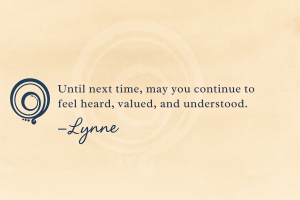Dear Therapist,
I’m concerned about my friend. Her drinking seems to be out of control. She told me she had a couple of glasses of wine while on her lunch break and laughed that she didn’t get much done after that. She works from home, and I’m worried she doesn’t stop drinking once she starts since she doesn’t have to be in the office. She let it slip one time that while on a video call with her boss she was questioned for appearing lethargic, and she played it off like she was sick. I don’t know how to approach her about my concerns without upsetting her or risking that she’ll cut me out of her life.
– Concerned Friend
Dear Concerned Friend,
I hear your concerns for your friend and it sounds like you really care about her. The warning signs are hard to ignore so it’s understandable to feel torn between wanting to help and fear that raising these concerns might push her away. Alcohol misuse can be difficult to recognize and even harder to talk about especially when it’s happening privately at home.
Trust your instincts. The behaviors you’re noticing drinking during work hours, minimizing the behavior, and changes in alertness or functioning may signal more than just social choices. They can be red flags that your friend’s relationship with alcohol is becoming unhealthy, and your concern is valid.
When you decide to talk to her, choose your moment and tone carefully. Pick a calm, private time when she hasn’t been drinking and emotions aren’t running high. Use a caring, non-accusatory tone. You might say something like, “I’ve noticed you’ve seemed different lately and I’m worried about you. I care about you, and I’m not judging, I just want to make sure you’re okay.” Avoid labeling her drinking or trying to diagnose her; instead, focus on what you’ve observed and how it makes you feel. For example: “When you said you had wine during lunch, it made me worry about how you’re coping.”
Focus on coming from a place of concern for her overall wellbeing. There’s likely underlying issues going on for her. Give her the space to hopefully open up beyond the drinking but what else is going on that led to the drinking during the day and work hours.
Be prepared for defensiveness. It’s common for people to minimize or deny their drinking, especially if they feel ashamed. Your goal isn’t to confront or convince her, but to gently plant a seed of awareness. Even if she reacts with anger or distance, your concern may still reach her later when she’s ready to reflect.
It can help to know what support looks like. You can gently suggest she talk to a therapist or reach out for help, reminding her that seeking support isn’t a sign of weakness. You might share resources such as the SAMHSA Helpline (1-800-662-HELP), which offers free, confidential support 24/7, or mention peer-support options like Alcoholics Anonymous (AA) or SMART Recovery. Local counseling or telehealth services can also be great resources for addressing substance use and emotional wellness.
Lastly, remember to take care of yourself, too. Supporting someone who may be struggling with alcohol can be emotionally draining. It’s possible to express care and still set healthy boundaries. You can’t make her stop drinking, but you can stay compassionate while also protecting your own peace.

This column is for informational purposes only and is not a substitute for professional mental health care. Reading this does not create a therapist-client relationship. If you are struggling with anxiety or another mental health concern, please reach out to a licensed professional in your area for support. If you are in crisis or thinking of harming yourself, please call 988 in the U.S. or go to your nearest emergency room.